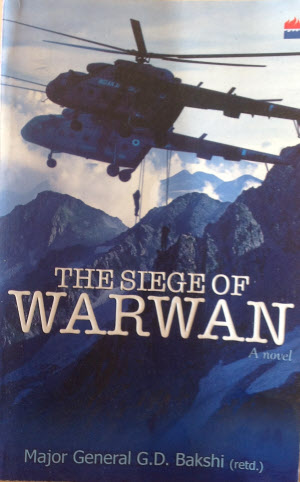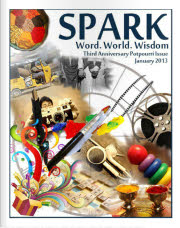by Vinita Agrawal
[box] The Siege of Warwan, written by war veteran, G.D. Bakshi, is a work that combines war action in Kashmir, a social message and a gentle love story, says Vinita Agrawal. Here’s a book review.[/box]The Siege of Warwan
by Major General G.D. Bakshi (retd)
Harper Collins
Price Rs. 299
Published 2011
“He melted me like snow,
Leaving me to course down
Like mountain streams and rivulets –
For he has forsaken me”
Habba Khatoon
The Siege of Warwan is a war novel with a difference. Yes it is about action, combat and the business of bravado but there is a strong underlying social message in the novel. The message is clear: children are the worst victims of the wars waged by men. To quote a line from the book – “They lost not only their lives, but also their illusions.”
As Brigadier Sibal Roychodury, one of the characters in the novel, writes in his journal one evening:
“For those of us who get to see it close range, the reality of Jihad in Kashmir is heartrending. Its leitmotif, its theme song is the endless wailing of women raising their voices in the traditional funeral lament. Those wails rise like an indictment of all mankind and its maker. They hover like a cloud over the ravaged landscape of Kashmir. …We pray fervently that it will change, that the laughter of the children will be heard once more on the hills. But before that, scores of men will have to die…”
 The novel is set in the traumatic decades when terrorism in Kashmir was at its peak. The world of Warwan is a world of AK-47s, AK-56s, Kalashnikovs, Night Vision Devices, explosive experts, radio technicians, intelligence breakthroughs, hard interrogations, Mi-17 helicopter rescues and raw verbal and physical exchanges between the army and the terrorists. At the same time, it is also the world of subtly brewing emotions, home to a pious peer who curses the town when he breathes his last and of deeply inspired souls like Ayesha and the heroic Major Dusty Bharadwaj.
The novel is set in the traumatic decades when terrorism in Kashmir was at its peak. The world of Warwan is a world of AK-47s, AK-56s, Kalashnikovs, Night Vision Devices, explosive experts, radio technicians, intelligence breakthroughs, hard interrogations, Mi-17 helicopter rescues and raw verbal and physical exchanges between the army and the terrorists. At the same time, it is also the world of subtly brewing emotions, home to a pious peer who curses the town when he breathes his last and of deeply inspired souls like Ayesha and the heroic Major Dusty Bharadwaj.
The story travels from the youthful corridors of the National Defence Academy (NDA) and the streets of Pune to the majestic snowbound valley of Warwan hemmed in on three sides by the majestic Hindukush mountains.
The storyline revolves ostensibly around Warwan Valley which is a coveted jihadi base of militants because of its strategic location. Major Dusty, the shy but determined protagonist of the novel, commands the lone Indian Army outpost there. Reeling under the angst of an unsuccessful love affair, he opts to enrol in the Rashtriya Rifles – a light-infantry equivalent of a division tailor-made for counter insurgency operations.
In Warwan, Dusty meets the heart-stirringly beautiful Ayesha, a doctor with a troubled past of her own. The exchanges between Dusty and Ayesha are rife with undercurrents and subtle passion. But the characters act with reserve and restraint, bound as they are by their unique situations.
The author, Gen. Bakshi does well to space out the confrontations between the leads else the novel runs the risk of becoming too soft. For a story that has a clear and strong anti-war message, such a softening would defeat the purpose of writing it. The novel remains undeterred from its depiction of stark, jaw-clenching army manoeuvres; the attraction brewing between Dusty and Ayesha only adds a beautiful and valuable dimension to the story.
Ayesha is fiercely loyal to the memories of her lover, Javed, though he is now a jihadi. She even names her son after him. However she is repeatedly traumatised by Kari Hanzala, a barbaric terrorist who slakes his baser appetites with her. Dusty – the hero inevitably rescues her. He is an admirable officer – passionate, fearless and courageous to the core. The novel has subtle psychological plots which lead to cleverly crafted circumstances. Genuine army-style plotting to dupe the enemy described in the novel lends tremendous reading excitement.
The book also gives a close-up view of terrorist activities. From the recruitment of young boys to the social demeaning of women to families ravaged by terrorists, the novel brings it all into focus. It is apparent that only a war veteran, who has actually endured these bitter realities, can bring them alive in such minute detail.
Gen. Bakshi shares with the reader that in the winters, terrorists dig bunkers underground, store upto a thousand kilos of food and hibernate. Yet, when necessary (as does infact happen in the novel) they can and do stage major battle action in the bitter winter months as well.
The book reveals that terrorists have astounding networks across the globe – with countries like Russia, Afghanistan, Chechnya, Algeria and Pakistan. They use sophisticated GPS guidance kits. They live in harsh mountain caves, hardly ever wash or bathe and have poor personal hygiene. They are shrewd and conniving and treat people like pawns; a man is kept alive as long as it is expedient, else he is brutally killed even if he is a Muslim.
As a war veteran, Gen. Bakshi successfully exposes the real extent of the terrorists’ ‘stomach’ for gruesome acts. Torture and exploitation are rampant in the name of jihad. Such revelations elevate this war novel to a book that provides an insight into the mind of a terrorist. Thankfully, it is done without sympathy.
Readers are likely to feel fortunate that by reading about the siege of Warwan, they discover how innocent Kashmiri civilians are made victims of their own faith, how even the remotest districts like NunKhun and Marud Valley have been shattered by terrorism.
The author’s military writing is interspersed with moving descriptions of nature, for which the land of Kashmir is so renowned. He begins many chapters with soul-stirring translations of Kashmiri poetry. These insertions lend a degree of authenticity and grace to the novel, and uplift it from being action-from-the-shoulder type of story-telling to something more sensitive and liberating.
“With the summer steadily on the wane,
Like the moon poised on the mountaintops
I too shall be gone”
Habba Khatoon
Though the book is dramatic and intense, the characters in the novel could have been better developed, their individual depths better explored. But every time such an opportunity arises, mid-battle action comes in the way!
The Siege of Warwan is worth reading because it highlights the sensitive side of war. Gen. Bakshi dedicates the book to all ranks of the Rashtria Rifles, past and present, and to the child warriors of the world. Gen. Bakshi’s wide-ranging and first-hand experience of live combat shines through in his writing.
Vinita Agrawal is a Delhi-based writer and poet and has been published in international print and online journals.
[facebook]Share[/facebook] [retweet]Tweet[/retweet]





